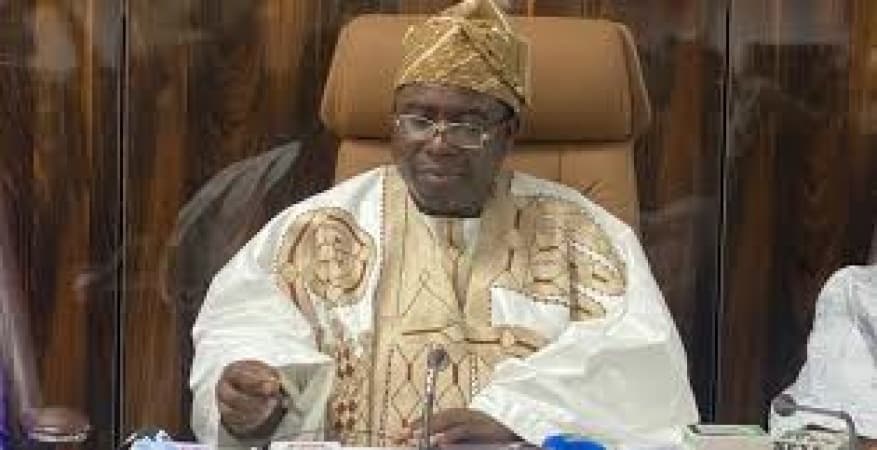
Prof Joash Amupitan, INEC Chairman
The federal government has remained silent on a 2020 legal brief reportedly written by the chairman of the Independent National Electoral Commission (INEC), Prof. Joash Amupitan, in which he described the Boko Haram insurgency and attacks by “Fulani herdsmen” as part of a coordinated anti-Christian campaign that warranted international intervention.
Calls and messages to the Minister of Information and National Orientation, Mohammed Idris, seeking the government’s comment on Amupitan’s legal brief, were not responded to as of press time.
This is even as Amupitan is yet to react to the issue since it was reported by SaharaReporters on Friday. He could not be reached on his mobile telephone line when Daily Trust called several times. A text message sent to him was also not replied to. His Chief Press Secretary, Dayo Oketola, could not be reached either.
Sources close to the INEC chairman, however, said he was preoccupied with the conduct of the weekend’s Anambra governorship election.
Amupitan was sworn in as INEC chairman by President Bola Ahmed Tinubu on October 23 following his confirmation by the Senate.
He was listed among the contributors to a publication titled ‘Nigeria’s Silent Slaughter: Genocide in Nigeria and the Implications for the International Community’, released in 2020 by the International Committee on Nigeria (ICON) and the International Organization on Peace-building & Social Justice (PSJ).
The report chronicled alleged systematic killings of Christians in Nigeria and called for international intervention. Amupitan’s 80-page chapter was titled ‘Legal Brief: Genocide in Nigeria.’
Also when contacted for comment on whether the Senate was ever aware of Amupitan’s claim on Christian genocide before confirming his appointment, the Senate’s spokesman, Yemi Adaramodu, told Daily Trust that the upper chamber was unaware of it.
“I have never seen it. We are not privy to it, something that I have never seen, something that the Senate has never seen.
“We have never seen, maybe you are the only person who is privy to it. This is something that is not before us; something we don’t know,” he said.
The legal brief, accessed by Daily Trust through the website of the publisher over the weekend, alleged that the scale and pattern of killings and displacement in Nigeria met the threshold for genocide under international law and accused the federal government of complicity by failing to protect affected communities and ensuring justice for the victims.
The federal government had, last week, dismissed similar allegations after American President Donald Trump re-designated Nigeria as a Country of Particular Concern (CPC) and threatened military action; a move tied to an alleged Christian genocide.
Nigerian authorities had maintained that the security crisis affected all religious groups and was not targeted at Christians.
Amupitan’s 2020 position, which contrasts sharply with the government’s long-standing stance, has prompted a call by the Supreme Council for Sharia in Nigeria (SCSN) for his removal.
Amupitan’s position, recommendations on ‘genocide’
In the paper, Amupitan, who was then a faculty member at the University of Jos, Plateau State, said, among other things, that “it is a notorious fact that there is perpetration of crimes under international law in Nigeria, particularly crimes against humanity, war crimes and genocide.
“One word that the Nigerian authorities and international investigators and rapporteurs have not mentioned (or simply refuse to mention) in respect of the protracted violence in Nigeria is ‘genocide.’ Is this a deliberate omission or an oversight?”
He added that the “alleged involvement of the state and non-state actors in the commission of crimes under international law in Nigeria has complicated an already complex situation. Consequently, the situation beckons the urgent need for a neutral and impartial third-party intervention, especially the UN and its key organs, the military and economic superpowers, and regional or sub-regional international organizations of intergovernmental character.
“In a globalized world, international law serves as a binding cord; state sovereignty diminishes to accommodate the common interests of the global community concretized by a mixture of consent, consensus and compelling norms.”
He added that “Boko Haram sect is a desire for the Islamization of Nigeria. The Fulani ethnic militants, on their part, have engaged in the same anti-Christian violence as their Boko Haram counterparts.
“Since it is the agenda of the Fulani to Islamize the whole of Nigeria, they have used the machinery of the State, deliberately handed over to them by the colonialists, to advance their course at all times. The period of the military regime was used maximally to create states and LGAs, and set boundaries, in a manner that gives economic and political advantages to the Hausa-Fulani ethnic group. The military regime ensured that major strategic appointments went to the Hausa-Fulani group, while their promotions in the public service, especially in the military, police, and customs, were accelerated. The well-orchestrated plan paid off for them because the other ethnic groups did not realize their agenda to Islamize the whole of Nigeria, and by the time the plan was being understood by some, though not all, of the other ethnic groups, the damage had already become too much. The military, police, customs, and the public service as a whole have been taken over completely, with Islamic fundamentalists planted in strategic positions to supervise the final phase of the agenda.”
In his legal brief, Amupitan had advised that the U.S. Department of State refer the case to the Criminal Division of the Department of Justice.
He had also called on the United Nations Security Council, its relevant organs, and major world powers to, among other recommendations, urge contracting parties to the Genocide Convention to sue Nigeria before the International Court of Justice (ICJ) for failing to prevent and punish genocide as required under Articles 8 and 9 of the Convention; and consider military intervention by the UN, the African Union (AU) or ECOWAS forces as a last resort, in line with Article 42 of the UN Charter.
Sharia Council wants Amupitan’s appointment reviewed
While reacting over the weekend, the Supreme Council for Shari’ah in Nigeria (SCSN) urged President Tinubu to review Amupitan’s appointment.
In a statement by Nafiu Baba-Ahmad, its Secretary-General, the council expressed “serious concern” over the document, describing it as a “toxic legal brief containing highly provocative, distorted, and bigoted assertions about the nature of conflicts in Northern Nigeria and maligning the historical legacy of Sheikh Uthman bin Fodio’s jihad.”
The SCSN said it was “unfortunate and disturbing” that someone now responsible for safeguarding Nigeria’s democratic integrity could have once promoted such divisive and sectarian views.
“If indeed Prof. Amupitan authored the said document, his submissions are not only unbecoming of a person of learning but dangerously inimical to the unity, peace, and stability of our country,” the council said.
It described as false and misleading Amupitan’s alleged analysis of “Christian genocide” and his characterization of northern violence as an extension of the 19th-century jihad led by Sheikh Uthman bin Fodio.
“Nothing could be further from the truth,” the statement said. “If we set aside the emotive distortions and examine the facts objectively, the reality is that the violence in Northern Nigeria is complex and multi-dimensional. Both Muslims and Christians have suffered immensely from violent extremists, banditry, and communal conflicts rooted in neglect, poverty, and social injustice.”
The council cited humanitarian data showing that Muslims have suffered more casualties in the affected areas, adding that it “defies logic and decorum to reduce these tragedies to a one-sided narrative of Christian persecution.”
It also faulted attempts to link the region’s current insecurity with the jihad of Sheikh Uthman bin Fodio, describing such claims as “a malicious distortion of history and a deliberate misrepresentation of one of West Africa’s most revered reform movements.”
“The jihad of Sheikh Uthman was not a war of hatred or extermination but a spiritual, moral, and social reform movement aimed at restoring justice, knowledge, and good governance,” the council added.
The SCSN argued that the position of INEC chairman demands the highest standards of neutrality, fairness, and inclusivity, qualities it said were inconsistent with the sentiments expressed in the alleged brief.
“Prof. Amupitan has demonstrated, through the content of that document, a deep-seated prejudice that calls into serious question his capacity to conduct free and fair elections in a multi-religious, multi-ethnic nation,” it said.
The council further expressed concern that such a person could have passed through security clearance and vetting before being appointed to such a sensitive position, describing it as “either a grave lapse in due diligence or a reckless approval that undermines public trust in the system.”
It, therefore, called on President Tinubu to “critically review the appointment of Prof. Amupitan as INEC chairman to safeguard the credibility of the nation’s electoral process.”
“The integrity of Nigeria’s elections cannot be entrusted to someone whose record reveals open hostility toward one of the country’s largest faith communities,” the statement added.
While reiterating its commitment to peace and unity, the SCSN urged Nigerians, both Muslims and Christians, to reject divisive narratives and focus instead on confronting common challenges such as injustice, corruption, poverty, and insecurity.
Lawyers who spoke to Daily Trust said the opinion Amupitan expressed in his legal brief does not undermine his current position as INEC chairman.
A Uyo-based legal expert, Nwoko Uwemedimo (SAN), told Daily Trust in a telephone chat that the matter does not warrant resignation or dismissal, and that the government’s position and the chairman’s past opinion represent two distinct issues.
“It is not the government that should dismiss him. If he feels strongly about his past statement, that is his conviction. The government is not denying that killings are taking place; what the government denies is the classification of those killings as genocide against Christians. The government agrees there is terrorism and insecurity, but insists that the violence affects both Christians and Muslims. The problem is continuous killing, that is the real issue,” he stated.
Uwemedimo argued that the INEC chairman’s role does not intersect with the subject matter of his alleged past opinion and therefore cannot reasonably create a conflict of interest.
“Relating it to his current job, I don’t think it requires him to resign. The position he occupies does not put that moral burden on him. If he were appointed as National Security Adviser, which directly handles issues of terrorism and national security, that would be a different matter. But as INEC chairman, his duties are entirely separate,” he argued.
He added that the existence of killings in Nigeria is undeniable and that both the government and society must confront this reality honestly.
Uwemedimo also criticized the apparent desensitization of Nigerian leaders and society to violence.
“Our leaders no longer feel horror at the loss of life. We have buried so many dead that death no longer frightens us. In a normal society, the killing of even one person should be treated as a national tragedy. But in Nigeria, we walk on blood and move on.
“If I were him, I would not change my position. The government would be shameless to attack him for speaking the truth about killings in this country. Debating his resignation is chasing shadows while ignoring the substance,” he added.
Josiah Adebayo, Head of Chambers at Akin Akinsanya (SAN) in Ilorin, Kwara State, said: “I don’t think it poses a conflict of interest or affects his job. The truth is, if you’re not part of the system, you cannot reform it. You can’t stand outside and keep criticizing; you must be within the system to drive meaningful change,” he said.
He noted that Nigeria’s political and social environment often amplifies ethnic and religious sentiments in public discourse which can cloud objective assessments of public officials’ capacities.
He emphasized that other groups, including Muslims and traditional worshippers, had also suffered from insecurity, and all sectors of society should voice their concerns equally.
“The government did not deny that Christians are being killed. What the government said is that it is not only Christians. So, there is no real conflict there,” he said.
Addressing calls for the chairman’s removal, Adebayo argued that the law protects the independence of the Independent National Electoral Commission (INEC) and its leadership.
He stressed that the president cannot unilaterally remove the chairman without due process.
“He has already been confirmed by the Senate. The president can’t simply remove him without following the same procedures that led to his confirmation. If the government tries that, he could sue and claim damages. But I don’t think the government will go to that extent. It should instead focus on fixing the security situation in the country. Once security is restored, everything else will fall into place,” he noted.
When contacted, Akin Onigbinde (SAN), said that although he had not read the opinion being referred to and therefore could not make much comment, he noted that there is a well-defined institutional process governing appointments to key national positions.
“This includes vetting and confirmation by the National Assembly and other relevant bodies. As such, any concerns about suitability should have been addressed during that process. There is a process by which people are appointed to office.
“The nomination goes through relevant Senate committees and finally through the National Council of State. If a person was duly confirmed through those institutional gates, which exist to ensure due diligence, you cannot lay the blame at his doorstep,” he said.
‘Amupitan’s genocide claim speaks to his integrity’
For his part, the immediate past Kwara State Director of Public Prosecution (DPP), Mumini Jimoh (SAN), expressed a different opinion.
According to him, Nigerians take different positions at different times depending on personal circumstances.
He said the INEC boss might have taken that position without knowing he would later be part of the present government.
He described it as unfortunate for him to have held such a view, insisting there has never been genocide against Christians.
“He must have been on the wrong side of the law when he held that view, if it is true that he authored it, though he was entitled to his own opinion. Thousands of Muslims are being slaughtered daily in Zamfara, in addition to the numbers in several northern states, including Kwara North. No right-thinking person can come to such a conclusion except out of parochialism.
“But if he has some decency, he would have rejected this appointment under a government that he said was committing genocide. Our elites change opinions like diets,” he stated.
He said the whole scenario now comes down to the question of integrity.
“This is where the issue of integrity comes in. When you say things that do not exist, as far as I am concerned, and author articles or make pronouncements that lack basis because of alleged parochial interest, it means you lack integrity and so do not have any business heading an administration like INEC. This simply means any such person can as well author results that are not valid,” he said. (Daily Trust)





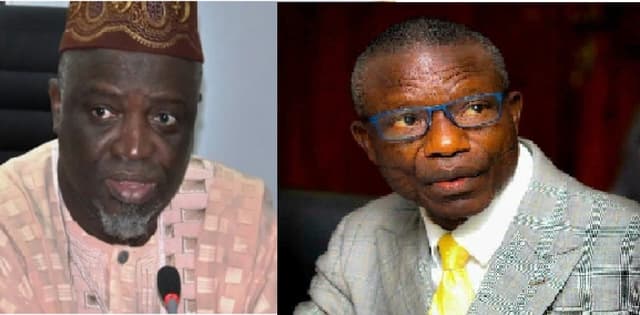




.webp&w=256&q=75)
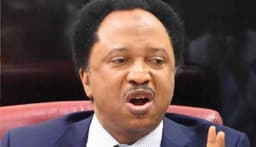

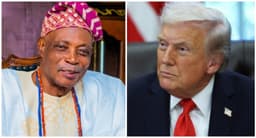
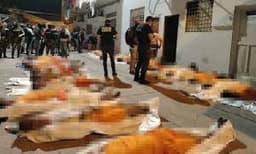






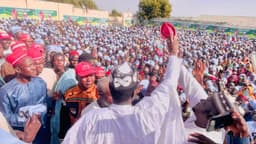
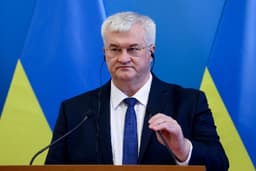

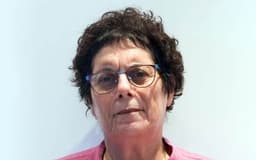


NEWS EXPRESS is Nigeria’s leading online newspaper. Published by Africa’s international award-winning journalist, Mr. Isaac Umunna, NEWS EXPRESS is Nigeria’s first truly professional online daily newspaper. It is published from Lagos, Nigeria’s economic and media hub, and has a provision for occasional special print editions. Thanks to our vast network of sources and dedicated team of professional journalists and contributors spread across Nigeria and overseas, NEWS EXPRESS has become synonymous with newsbreaks and exclusive stories from around the world.